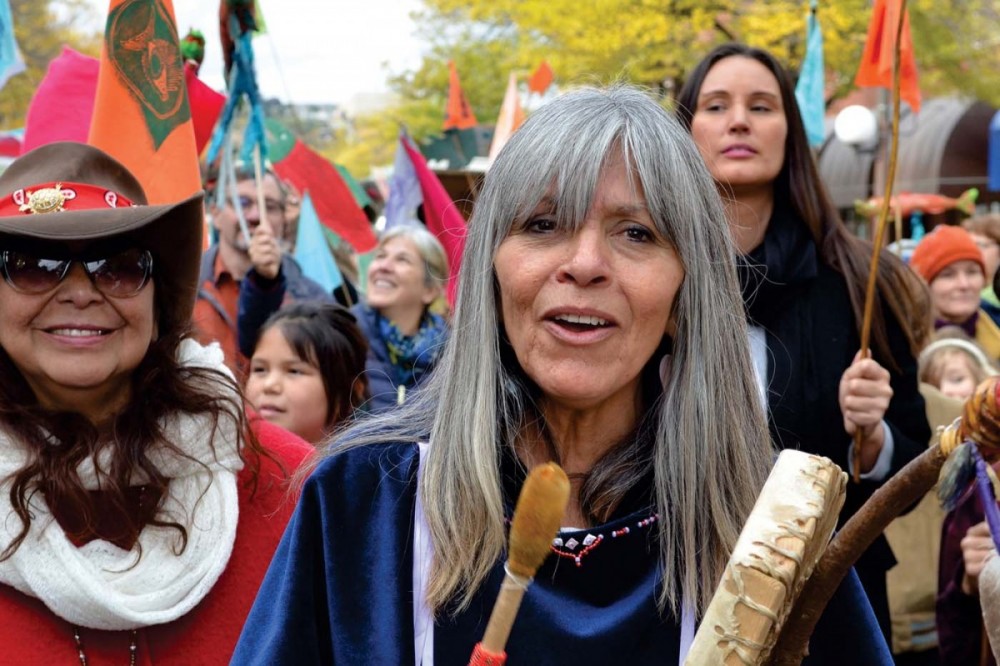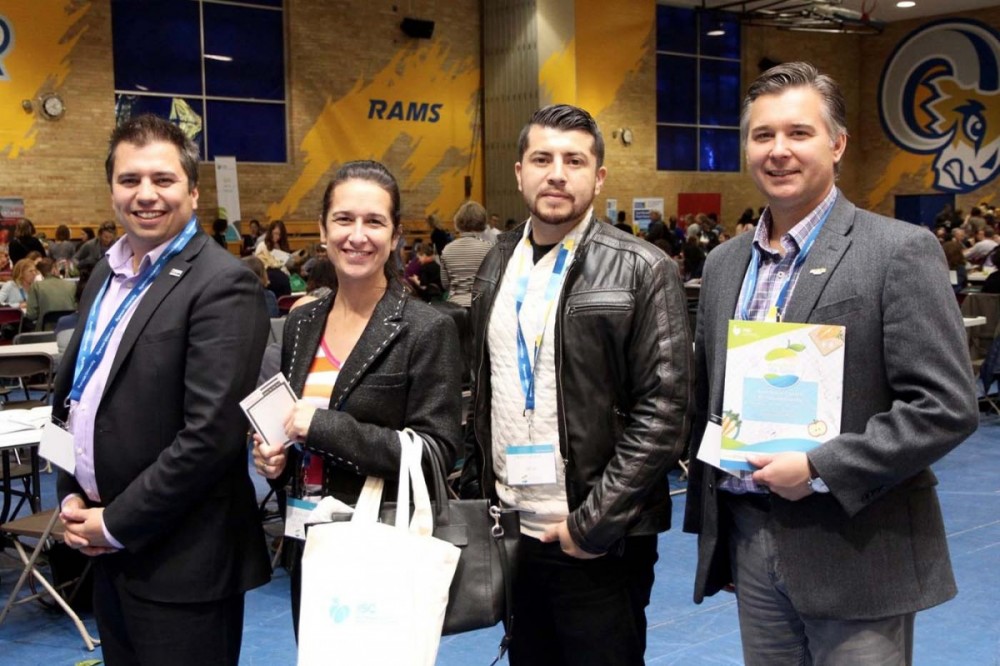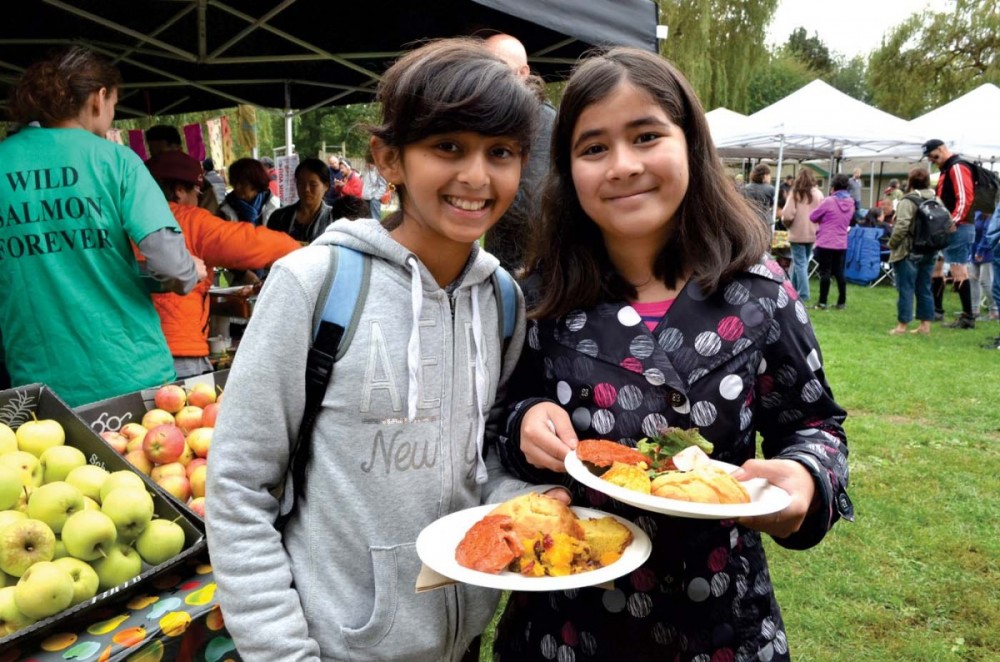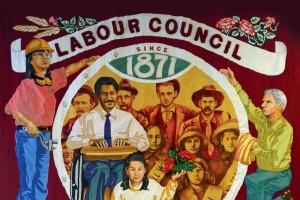Creating a national food policy for Canada is an ambitious and wide-ranging undertaking, not only because of the varied complexities involved in producing and obtaining food throughout the country, but also because financially secure individuals have vastly different experiences than the food-insecure, who contend with diverse barriers to basic nutrition and a full stomach.
THE RIGHT TO FOOD
"Four million Canadians actually live in food insecurity," says Diana Bronson, executive director of Food Secure Canada. "That means they cannot afford to put a healthy diet in their mouth. That is crazy in a country like Canada, which is why we are calling for the recognition of the right to food inside A Food Policy for Canada, so that whatever happens, we can be sure that we can begin to progressively realize this right."

Zero hunger, healthy and safe food, and a sustainable food system for all Canadians are goals we need to enact nationally, says Diana Bronson, executive director of Food Secure Canada. PHOTOGRAPH: GUY MAYER
Food Secure Canada is the umbrella organization bringing together a variety of partners all seeking to enact three goals nationally: "zero hunger, healthy and safe food, and a sustainable food system for all Canadians." It has been a major player in the recently concluded public consultations on developing the policy, which was proposed by the Liberals during the last federal election campaign. Talks began in May and public consultations were held across the country until the end of September 2017.
Food is an issue that, however basic, leaves no one untouched. Greg Meredith, an assistant deputy minister at Agriculture Canada who is responsible for formulating the national food policy, has publicly stated that food security, health, environmental concerns, and sustainability and continued growth in the agricultural-food sector are its four pillars.
FOOD IS POLITICAL
Who eats, and what they consume, is a highly political subject, with a history rooted in colonialism. Dawn Morrison, founder of the Working Group on Indigenous Food Sovereignty, tells Our Times that artificially compartmentalized views of food and its creation have brought harm to the more than 1.4 million Indigenous people in Canada, as well as millions of other people and those ecosystems altered for agricultural "production."
It's a word Morrison says she dislikes because of how it defines food, the many ways of obtaining it, and the lives it impacts: "'Productionism,' which was instituted during the Industrial Revolution, is instituting the spirituality right out of our food system. The food has become just a product, or something to quickly cook up and slam on the stove and shove down your throat, right? When you're in communion with your food, you can achieve a much higher level of health."

Dawn Morrison during the opening parade of the Wild Salmon Caravan through the unceded territories of the Musqueam, Squamish and Tsleil-Waututh peoples. The Caravan celebrates the spirit of wild salmon through arts and culture. PHOTOGRAPH: MURRAY BUSH/ FL
The Indigenous food sovereignty activist says health, at community, personal and ecological levels, is compromised when industrial farming and ecologically damaging practices like fracking, mining, and oil and pipelines take precedence.
"We can talk about it on a systemic scale, in terms of the global food system, and thinking about the economics and trade," explains Morrison. "The Ministries of Agriculture, and Fisheries and Oceans, their primary mission is global export for trade. So their goals are no longer about supporting people locally, and looking at different systems at an institutional level.
"Indigenous food systems have been made invisible in the reductionist paradigm of western science, and they require a different framework for research and development that is better able to understand and deal with the complexity involved in more of an ecosystem-based approach."
The means of sourcing and distributing food have become exponentially more narrowly defined over the last two centuries, and were earlier restricted when Europeans imposed constraints on Indigenous people, notes Morrison.
ACKNOWLEDGING INDIGENOUS SOVEREIGNTY
"Indigenous biodiversity and cultural heritage is a complex system of land, water, people, knowledge, genetic code, genetic variation, social systems. And it's very beautiful and rich and complex and diverse." When a capitalistic approach was imposed and applied to traditional ways of obtaining and sharing nourishment, she says it failed to acknowledge Indigenous sovereignty in relation to land, food, water and heritage.
"We never surrendered or ceded our relationship to the land," she points out.
Derek Johnstone of the United Food and Commercial Workers Canada (UFCW Canada) outlines why his union has been helping in the development of A Food Policy for Canada.
"We represent a quarter of a million workers across the country, in every province of the country, and 80 per cent of our membership is connected to the food industry, throughout the food chain, from agriculture, the person who picks the tomatoes, right through to the person who places your bacon, tomato and lettuce sandwich on the table of the restaurant, and everything in between. We are a direct and intimate component of the food chain in Canada."
Moving beyond the conventional dialogue about food, which usually includes government, academics, and business interests, is crucial, Johnstone says. He wants to see greater input from frontline workers in the sector.
ASK THE FOOD WORKERS
"I think it only stands to reason that food workers should have a very active role and a very clearly heard voice in how food is produced, and how it's distributed throughout the country," argues the former meat-cutter.
"Also, when you're talking about a quarter of a million people and their families, you're talking about a huge number of actual food consumers throughout the country. So in every element of the production, distribution and consumption of food, union members have a very significant role."
Excluding the perspectives of the most essential players in the food chain has resulted in an ungainly, profit-oriented industry which fails to provide affordable nutrition for wide swaths of the population.
Diana Bronson says that while food-distribution issues do affect parts of the country, especially "more northern and remote communities," food insecurity overwhelmingly stems from a single cause: poverty.
"It's a question of incomes," she explains. "If you look at who the food insecure population is made up of . . . 60 per cent of the people who are considered food insecure are actually working. They're not people who don't have jobs; their jobs just don't pay them enough, or they don't have enough hours, to be able to afford to feed their families."
THE RISE OF FOOD BANKS
The rise and normalization of food banks across the Canadian landscape highlights the crisis, adds Bronson. Once intended for emergency or occasional use by society's most disadvantaged, their escalating use showcases why a national food strategy, not stopgap measures dependent upon charity and volunteers, is essential.
"It's a big problem, and I don't say that to criticize people working in food banks, or the patrons, or anybody else," continues the Food Secure Canada executive director. "The vast majority of people living on social assistance in this country are also food insecure. We set the bar so low for people on social assistance that you can't possibly make it to the end of the month without going to a food bank, which some 900,000 Canadians are going to every month."
Education, often touted as a ladder out of poverty, has become so costly that students are also increasingly reliant on food banks. "They now are a standard feature of university campuses," observes Bronson.
"Sure, students have always been on a tight income — we've known that for a while. But going to food banks? That's a relatively new thing."
Ironically, food insecurity even affects Canadian workers employed in any of the various food industry jobs which fail to provide a living wage. As Derek Johnstone points out, some of the most marginalized people employed in Ontario agriculture endure indignities both on the job and embedded in the legislation surrounding their sector.
"If you work on a farm in Ontario, regardless of your background, you are excluded from the Ontario Labour Relations Act, meaning you cannot join a union, and Ontario is the only jurisdiction in the country where that is the case. It's unbelievable that in the 21st Century, you have a substantive portion of the provincial workforce, in one of the most important sectors of our economy, barred from exercising the same labour rights as everybody else."
JUSTICE FOR MIGRANT FARM WORKERS
The importance of legalizing union membership and organizing among farm workers is perfectly illustrated in conversation with Francisco, a Mexican migrant farm worker in Leamington, Ontario. (He requested that his full name and hometown not be disclosed, in order to protect his employment and family, and communicated his answers with the assistance of a UFCW Canada translator, Santiago Escobar.)
"We agricultural workers are those who grow, process, and pick vegetables and fruits, etcetera," says Francisco, in Spanish. "We give the best of us, we do it with much affection, so that the Canadian families receive on their table the very best products. Therefore, we want our voices to be heard, and the public to know about the bad working conditions in which we work, and the injustices we face day by day."
Francisco says that joining a union would help him and his co-workers protect themselves from dangerous and exploitative working conditions. "We leave our families in our countries so we can feed them and our children can go to school, because in our countries, there is no work. But it is not fair that because of our needs, here in Canada we face abuses."
A typical work day for Francisco and his co-workers begins at 5 a.m. He says they must prepare their meals the evening prior, as there is no time in the morning. "We go to work at 7 a.m. and work non-stop until lunch," with breaks dependent upon the supervisor's mood that day, says the migrant farm worker. "There is a lot of physical and psychological pressure — for the boss, our work is never enough. Every day, we are expected to produce more.
"If the day before, we produced 100 boxes of tomatoes, the next day, we must produce 110 boxes. There is a TV screen with our names shown that reflects what each of us produces during the day. The bottom five will be punished by being suspended for two to three days without pay.
"We know when we start, but not when our work day ends," continues Francisco, via his translator. "We get paid overtime; we cannot refuse to work. If you say you cannot work a day, for example, because of a [health] problem, they say you will be sent back to your country, either Guatemala or Mexico."
He describes the case of a colleague who "shattered his hand" on the job: "Instead of taking him to the doctor, the next day he was taken to the airport to be returned to his [home] country. On top of that, he had to pay for the return flight, even though the price of the ticket had already been deducted from the payment we receive. There is no respect for the contract."
LABOUR RIGHTS ARE HUMAN RIGHTS
Derek Johnstone says A Food Policy for Canada must enshrine labour rights in order to achieve goals of food safety and supply, but also because labour rights are vital for their own sake.
"We have a vested interest, of course: We want Canada to become a global superpower with regard to food production," he shares. "We want Canada to have an international reputation where we feed the world. We want Canada's food industry to continue to build and grow because I think, in a lot of ways, food is going to be the new oil in the 21st Century."
Without corresponding creation of "more good union jobs in the sector," Johnstone warns that the agri-food sector will encounter threats to its ambitions. "We're not going to have workers who will speak up and blow the whistle on food safety issues."
He notes that unionized meat-cutters' work conditions have changed for the better with increased union density, and even traditionally marginalized workers employed in the sector have experienced great gains.
"In the meat-packing sector, workers can join the union, and improve their lives through bargaining collectively; in the case of temporary foreign workers, the union contract actually becomes a pathway to citizenship [through some of Canada's largest employers, in Alberta and Manitoba].
"It's a tremendous example of the power of the union. There's a striking contrast between what happens when workers have that right and when they don't; and what impact that has on their lives and also on standards — for us as workers and consumers throughout the food industry."
He adds that with the strong recent growth seen in the Canadian food-service industry, these jobs must also be taken into serious account by Canada's national food policy.
"We have tens of thousands of retail workers and food and hospitality workers across the country who are quite proud of what they do. On the food-service side, it's a question of needing more union density. You'll see on the food-processing side, we have some very strong contracts."
In fact, Johnstone says, "The meat sector is the largest element of the food-manufacturing sector. And food manufacturing is the largest element of the manufacturing sector in Canada. You look at the food-processing sector, and it's a very high level of union density."
Wherever food-service workers are unionized, many of the stereotypical conditions that promote high staff turnover are removed, allowing for the "well-paid work and job security" Johnstone says should be the norm.

From left to right, UFCW Canada representatives Mark Hennessy, Debora De Angelis, Pablo Godoy and Derek Johnstone attend Food Secure Canada’s 9th Assembly, held in Toronto in 2016. PHOTOGRAPH: COURTESY UFCW CANADA
"The fact of the matter is that the greatest growth in the labour market is in the service sector," he adds. "It's in restaurants. It's in food services and retail operations. Those are the jobs of the future that we, as a union, are focused on raising density in, through organizing; we're an organizing union, as best we can, to assist those workers in exercising their right to engage in the collective bargaining process.
"We as trade unionists believe that the only true way to advance standards in that or any sector is through more workers in the union, and workers sticking together and working together to improve their workplace and through that, their living standards."
Francisco says, at present, there is no such consideration for frontline migrant Ontario farm workers. "We have to stay at the farm," he notes. "We can't just punch our card when we enter the greenhouse at 7 a.m." He says there is no drinking water besides what the workers provide for themselves; nor is there safety equipment to shield labourers from pesticides.
"The Canadian workers are not pressured the same way as we are," continues the worker who provides for three dependent people in Mexico. "They aren't asked for speed; they aren't yelled at. They may be late; we can't. They have their 50-minute break; sometimes they give us 10 minutes. They can go to the washroom during work; we can't. In some cases, they have better salaries, too."
In 2018, Francisco says he and his colleagues will be able to earn $14 hourly, which still seems inadequate compensation for the demanding work, let alone the other compromises faced on the job. "The employers should be less greedy and more fair to the workers," he tells Our Times. "If we were not there, who would grow the vegetables in Ontario?"
Francisco says that being allowed to organize would improve the situation considerably: "In Québec, for example, they have the right to unionization. Workers there tell us that by joining UFCW Canada, their working conditions have improved a lot."
As for the commercial price of food being driven higher by improved rights and wages for workers, Francisco argues that consumers and people working in the agricultural field both benefit when the latter are treated as human beings, not "robots."
Consumer tastes have actually taken on a more ethically oriented slant in recent decades, opening a space for change. "In the food sector more and more, there is focus on organic products, and fair trade is preferred, so it is necessary that the Canadian food policy includes fair labour practices in Canada, for local and migrant agricultural workers," advises Francisco.
Dawn Morrison has been leading the Working Group on Indigenous Food Sovereignty in the development of various projects, one of which is the Wild Salmon Caravan, a celebration of the spirit of wild salmon through arts and culture. The project engages artists, food-systems networks, and communities in public education to raise awareness of the important role that wild salmon play in Indigenous cultures and ecosystems.
POWER IN THE PEOPLE
"I feel that the answers to some of the world's social and ecological crises . . . lie in the people, and a really powerful kind of alliance between Indigenous people and labour unions," she says. "Because the average working class, middle class — all people — is where the real power lies.
"I feel like we invest a lot of power in government, yet the government system, the techno-bureaucracy, is a part of the problem. It's made us, Indigenous peoples, invisible.
"How do we reorganize and re-vision our economy so that it's more hopeful and so that it is about social justice, it is about sharing with people who need it? How do we value that? How do we reward that?" asks Morrison.
"The more research I've done, the more I've realized that the regenerative life-giving paradigm has never died in the face of productionism that has eroded our cultures and tribal economies. It never stopped happening, we just don't realize it, and capitalism externalizes all those other values."
With consultations on A Food Policy for Canada now concluded, it remains to be seen which values will feature most prominently in the finished document. In From Patchwork to Policy Coherence: New Directions for Canadian Food Policy, Diana Bronson's presentation to the Standing Committee on Agriculture (released by Food Secure Canada on September 26, 2017), she outlined "priority actions" that the federal government must take to address the damaging long-term effects of haphazard policy in the agri-food sector.
Her conclusion is that with greater coherence, "Food policy has the potential to help the federal government achieve many of its top goals: Human rights, [Indigenous] reconciliation, youth empowerment, sustainable economic growth, better health, more innovative and open policy making." A sharing of more perspectives, so that we can envision a future with more to share around the (literal) table.
Melissa Keith is a former radio broadcaster and an award-winning freelance journalist. She lives in Lower Sackville, Nova Scotia.






_300_200_90_c1.jpg)








